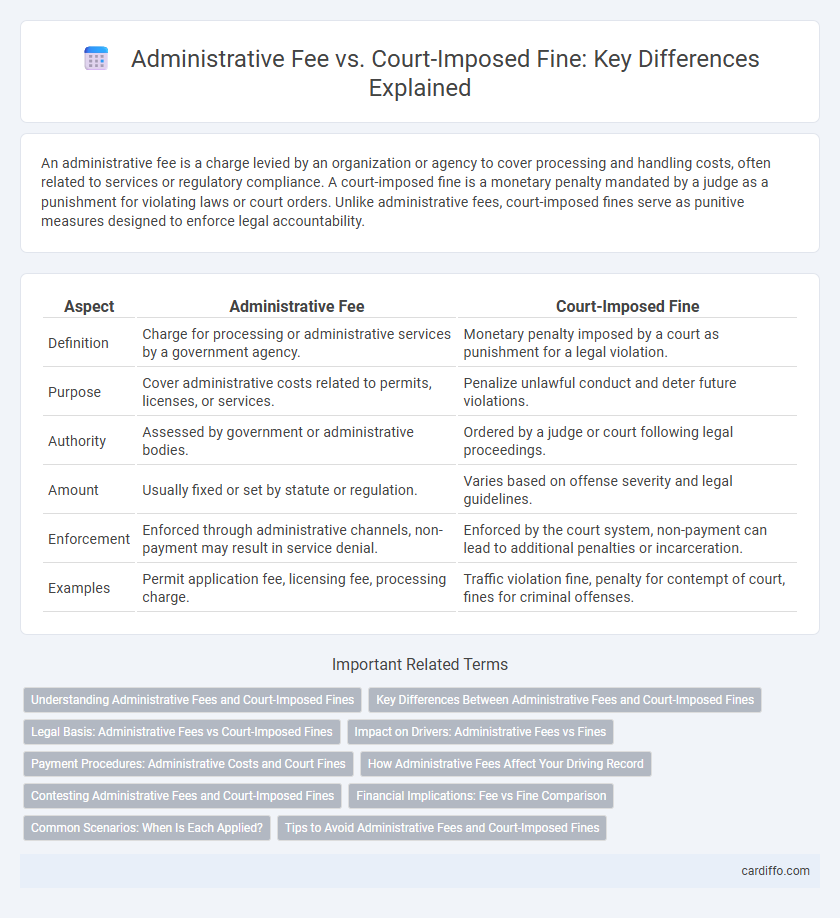An administrative fee is a charge levied by an organization or agency to cover processing and handling costs, often related to services or regulatory compliance. A court-imposed fine is a monetary penalty mandated by a judge as a punishment for violating laws or court orders. Unlike administrative fees, court-imposed fines serve as punitive measures designed to enforce legal accountability.
Table of Comparison
| Aspect | Administrative Fee | Court-Imposed Fine |
|---|---|---|
| Definition | Charge for processing or administrative services by a government agency. | Monetary penalty imposed by a court as punishment for a legal violation. |
| Purpose | Cover administrative costs related to permits, licenses, or services. | Penalize unlawful conduct and deter future violations. |
| Authority | Assessed by government or administrative bodies. | Ordered by a judge or court following legal proceedings. |
| Amount | Usually fixed or set by statute or regulation. | Varies based on offense severity and legal guidelines. |
| Enforcement | Enforced through administrative channels, non-payment may result in service denial. | Enforced by the court system, non-payment can lead to additional penalties or incarceration. |
| Examples | Permit application fee, licensing fee, processing charge. | Traffic violation fine, penalty for contempt of court, fines for criminal offenses. |
Understanding Administrative Fees and Court-Imposed Fines
Administrative fees are charges levied by government agencies to cover the costs of processing permits, licenses, or other administrative tasks, often fixed and non-punitive in nature. Court-imposed fines are monetary penalties ordered by a judge as punishment for violating laws or court orders, varying in amount based on the severity of the offense. Understanding the difference helps individuals and businesses manage legal and financial responsibilities effectively while ensuring compliance with regulatory and judicial requirements.
Key Differences Between Administrative Fees and Court-Imposed Fines
Administrative fees are charges imposed by government agencies to cover processing or service costs and are generally not punitive. Court-imposed fines result from legal violations and serve as punishments intended to deter unlawful behavior. Key differences include their purpose, with administrative fees addressing administrative expenses and court-imposed fines functioning as penalties, as well as their enforcement mechanisms and appeal processes.
Legal Basis: Administrative Fees vs Court-Imposed Fines
Administrative fees are typically imposed by government agencies based on statutory regulations, serving as charges for processing or regulatory services rather than penalties. Court-imposed fines originate from judicial rulings and are punitive measures established under criminal or civil law statutes to penalize unlawful conduct. The legal basis for administrative fees lies in administrative law, while court-imposed fines derive their authority from legislative statutes enacted to enforce public order and legal compliance.
Impact on Drivers: Administrative Fees vs Fines
Administrative fees often result in fixed charges that directly impact drivers' financial responsibilities without affecting their driving records, whereas court-imposed fines can vary in amount and may lead to points on a driver's license, increasing insurance premiums. Drivers facing administrative fees typically experience immediate out-of-pocket costs but avoid long-term consequences, while fines imposed by courts can influence future legal and insurance considerations. Understanding the distinction helps drivers anticipate both the financial and legal consequences of traffic violations.
Payment Procedures: Administrative Costs and Court Fines
Payment procedures for administrative fees typically require submitting the amount directly to the relevant government agency, often through online portals or designated offices within a specified deadline to avoid penalties. Court-imposed fines must be paid according to judicial instructions, which may include options such as in-person payments at the courthouse, electronic transfers, or payment plans authorized by the court. Failure to comply with payment procedures for either administrative costs or court fines can result in additional charges, enforcement actions, or legal consequences.
How Administrative Fees Affect Your Driving Record
Administrative fees related to traffic violations typically cover processing and administrative costs rather than punishment and generally do not impact your driving record or points. Court-imposed fines, however, are penalties directly tied to specific offenses and can result in points added to your driving record, potentially affecting insurance rates and license status. Understanding the distinction is crucial as administrative fees usually do not influence driving privileges, whereas court fines contribute to cumulative driving infractions.
Contesting Administrative Fees and Court-Imposed Fines
Contesting administrative fees requires understanding that these charges are typically imposed by agencies for processing services and may be waived or reduced through formal appeal procedures. Court-imposed fines result from legal penalties for violations and often necessitate filing motions or attending hearings to dispute the charges. Both processes demand careful documentation and timely action to effectively challenge the imposed fees or fines.
Financial Implications: Fee vs Fine Comparison
Administrative fees are fixed charges imposed by government agencies to cover processing costs, typically resulting in predictable financial obligations for individuals or businesses. Court-imposed fines vary based on the severity of the offense, often carrying higher financial penalties and potential additional costs such as interest or enforcement fees. Understanding the substantial difference in financial impact between administrative fees and court fines is crucial for effective legal and financial planning.
Common Scenarios: When Is Each Applied?
Administrative fees typically apply in scenarios involving permit processing, license renewals, or administrative hearings where costs cover operational expenses without penal consequences. Court-imposed fines arise from legal violations such as traffic offenses, misdemeanors, or regulatory breaches, serving as punitive measures determined by a judge. Understanding these distinctions helps individuals anticipate financial obligations in civil or criminal proceedings effectively.
Tips to Avoid Administrative Fees and Court-Imposed Fines
To avoid administrative fees and court-imposed fines, promptly pay all tickets and comply with court deadlines to prevent late penalties. Keeping thorough records of payment receipts and court communications helps contest any erroneous charges effectively. Engaging with legal counsel when necessary ensures adherence to procedural requirements and mitigates the risk of escalating fines.
Administrative Fee vs Court-Imposed Fine Infographic

 cardiffo.com
cardiffo.com